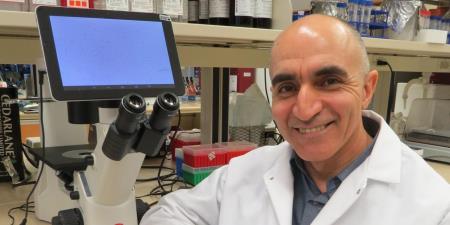
Immunologist Shokrollah Elahi is one of five University of Alberta-based researchers and members of the Women and Children's Health Research Institute (WCHRI) to receive the CIHR New Investigators in Material, Reproductive, Child and Youth Health national research award.
Immunologist Shokrollah Elahi is one of five University of Alberta-based researchers and members of the Women and Children's Health Research Institute (WCHRI) to receive the CIHR New Investigators in Material, Reproductive, Child and Youth Health national research award.
Elahi's research focuses on how the immune system of a newborn allows for swift adaptation to good bacteria in the gut. Compared to adults, infants are highly susceptible to developing infections and immune disorders like allergies, asthma and inflammatory bowel diseases (IBDs).
Understanding how the immune systems of infants develops is key to finding solutions says Elahi.
"We've shown that newborns are physiologically enriched with immature red blood cells. These cells are suppressing their immune system. Their presence is associated with poor immune response to pathogens, but they play a crucial role in early life for gut tolerance to colonize with good bacteria," says Elahi. "My research will build on our recent published data to give novel insight into how the neonatal immune system differs from adults."
The CIHR research award will help further research, published in the Journal of Immunology, Erythroid suppressor cells compromise neonatal response against Bordetella pertussis, Elahi's research team for the first-time has shown that these immature red blood cells, whose primary function is to carry oxygen through the blood, also have an immunological role―suppressing the immune system in newborns.
These studies will assist researchers to better understand how the neonatal immune system functions in order to develop novel interventions to prevent immune disorders such as allergies and autoimmune diseases he added.
"Understanding the immune mechanisms that operate in infants is key to developing new approaches to improve their health around the globe. The challenges of infant infections and immune disorders such as allergies may be two sides of the same coin," he said.
Total funding for the five projects will be $1.1 million over the next three years. This funding will impact the health outcomes of women and children in Alberta - an area of health research that continues to be underrepresented.
These projects were possible thanks to fund matching from the Women and Children's Health Research Institute through the Stollery Children's Hospital Foundation along with partnering faculties and departments within the University of Alberta. This shared commitment to improving health outcomes for women and children propels Edmonton forward as a national leader in health care innovation.